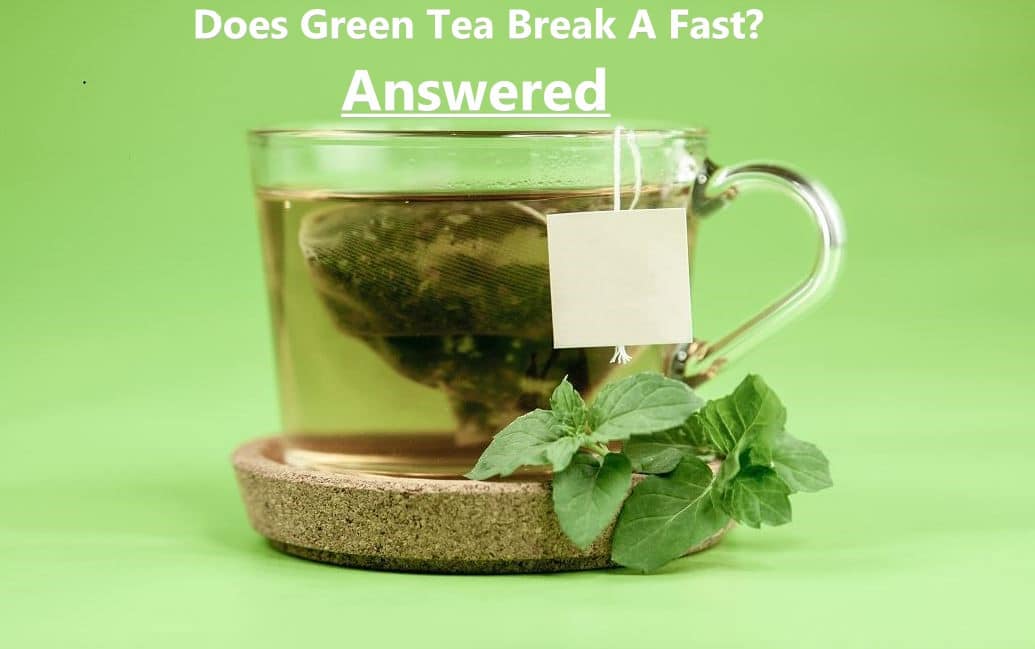Does Drinking Green Tea Break My Fast? Our specialists thoroughly examine green tea, its advantages within the context of intermittent fasting, and its impact on fasting adherence.
Maintaining adequate liquid intake is crucial while observing intermittent fasting. While water remains the primary choice for many, the desire for a slightly flavored option occasionally arises. Among the array of flavored beverages for those adhering to a low-calorie regimen, green tea stands out.
However, a crucial query arises: Does consuming green tea compromise the fasting state? Our experts comprehensively elucidate the benefits associated with green tea consumption and address the pivotal concern: Does Green Tea Break A Fast?
Quick Summary
Topic: Can You Have Green Tea While Fasting?
Answered: Certainly! Green tea, scientifically known as Camellia sinensis, is among the calorie-free beverages that can be consumed without any concerns during fasting periods.
In fact, numerous experienced practitioners of intermittent fasting recommend incorporating green tea into your routine as it aids in maintaining hydration levels and suppressing appetite sensations.
Intermittent Fasting: An Overview
Intermittent fasting (IF) represents a burgeoning health and dietary trend. Its rapid rise in popularity is rooted in its potential to not only streamline one’s lifestyle but also foster improved well-being and weight management. Unlike many dietary approaches, intermittent fasting remains distinct and enduring. Anchored in a time-tested methodology, it concentrates on abstaining from meals over extended periods. Beyond being a mere weight reduction strategy, fasting assumes a profound role in various religious observances, spanning diverse faiths from Hinduism to Christianity. This longstanding familiarity with fasting underscores its far-reaching influence on human health, encompassing both the physical and spiritual realms. Within religious contexts, fasting serves to uphold not only bodily vitality but also internal serenity. The lingering question of whether tea disrupts a fast is addressed within this article, along with a comprehensive exploration of intermittent fasting’s nuances.

IF, in essence, transcends the realm of diets, shifting the focus from altering the content of consumption to revolutionizing the very process of eating.
The IF regimen entails structured eating and fasting intervals, characterized by an “eating window” and a corresponding “fasting period.” A prominent pattern, known as the 16/8 method, often entails foregoing breakfast and confining eating to an 8-hour timeframe, such as 1 PM to 9 PM. Subsequently, a 16-hour fasting period ensues.
Before embarking upon the intermittent fasting journey, it is crucial to ensure both physical and mental preparedness for its demands. This dual-purpose practice, intertwined with spirituality and weight management, necessitates substantial commitment, placing the body under considerable stress. Throughout fasting, calorie intake is drastically curtailed or completely suspended. The duration of fasting varies, extending from half a day to even a week. Hence, the inevitability of hunger-induced physical frailty over an extended duration must be acknowledged. Persistent mental prompts urging consumption will require deft management. For prospective initiates, consulting a medical professional before commencing fasting is prudent, ensuring alignment with one’s health profile.
Nonetheless, intermittent fasting could potentially entail adverse health implications, manifesting as:
- Fatigue
- Headaches
- Dizziness
- Nausea
- Diarrhea
- Indigestion
- Elevated blood pressure
- Heart palpitations
- Abdominal discomfort
- Lower back pain
- Exacerbation of arthritis-related discomfort
Can Green Tea Be Consumed During Intermittent Fasting?
In brief, the answer is affirmative. Consumption of green tea is indeed permissible during periods of fasting. This is due to the fact that green tea is devoid of calories, thus not interfering with the fasting state.

Incorporating a serving of green tea into your routine could prove advantageous, particularly for individuals embarking on their intermittent fasting journey. Notably, green tea possesses the ability to suppress appetite and provide a sensation of fullness, potentially aiding in managing hunger within the fasting timeframe.
What is the Caffeine Content in Green Tea?
Naturally, green tea contains caffeine, and its quantity can differ in each cup. This variation is attributed to factors such as the tea plant’s characteristics, cultivation methods, and brewing techniques.
On average, an 8oz cup of green tea typically contains approximately 35mg of caffeine. Considering that a daily caffeine intake of under 400mg is generally considered safe for most individuals, it’s noteworthy that a cup of green tea contains significantly less caffeine compared to an 8oz serving of black coffee.
The Impact of Caffeine from Green Tea on Fasting
Tea, encompassing both green and black varieties, contains caffeine, a factor that exerts an influence on the fasting process. A standard 8 oz. serving of brewed green tea contains 28 mg of caffeine, while its black counterpart contains a higher amount, measuring 47 mg. Caffeine consumption up to 400 mg per day is generally considered safe. However, individual tolerance to caffeine varies based on factors such as health status, lifestyle, and personal habits. It’s advisable for individuals who frequently experience headaches and anxiety to exercise caution in consuming large quantities of caffeine.
Caffeinated beverages have the potential to exacerbate feelings of anxiety and increase alertness. Consequently, excessive caffeine intake can disrupt sleep patterns and complicate the fasting regimen. Ensuring sufficient sleep during fasting periods is important to resist the urge to prematurely conclude the fast. Furthermore, a quality 8-hour sleep contributes to the fasting process by aligning with the anticipated eating window. It’s worth noting that the consumption of caffeinated beverages can influence the body’s circadian rhythm, potentially disturbing normal bodily functions.
Moreover, the consumption of caffeine in excess of 250 mg per day can lead to a notable elevation, by up to 10 mmHg, in both systolic and diastolic blood pressure. In addition, caution should be exercised when consuming caffeine after a prolonged period of fasting. In the scenario where one has fasted for 10 hours and subsequently ingests a quantity of caffeine ranging from 150 to 300 mg, there exists the potential for a subsequent increase in urinary calcium excretion. As a consequence, a considerable intake of tea within the designated eating window carries the inherent risk of inducing hypercalciuria.
Green Tea Overview: Unveiling its Pervasive Popularity
Green tea stands as a globally cherished beverage, second only to water. Its appeal lies in its minimal caloric content coupled with delightful flavors and remarkable health benefits. With just 2.5 calories per cup, green tea proves to be an excellent choice, even during periods of fasting. Beyond its taste, this tea boasts a substantial nutritional profile, encompassing proteins, amino acids, carbohydrates, lipids, xanthic bases, pigments, minerals, and vitamins B, C, and E. Its applications extend to traditional Chinese medicine, where it garners extensive acclaim as a therapeutic agent.
At the crux of green tea’s acclaim is its role as an exceptional antioxidant, proficient in thwarting an array of critical ailments, ranging from cardiovascular disorders to various cancers. Central to its exceptional properties are a multitude of catechins, particularly epigallocatechin gallate (ECGG), renowned for its potent antioxidative prowess. This compound not only restrains the proliferation of cancerous cells but also eradicates them without compromising healthy tissues. Furthermore, ECGG has shown promise in diminishing LDL, or “bad,” cholesterol levels.
What Makes Green Tea Exceptionally Beneficial?
The exceptional usefulness of green tea primarily stems from its unique processing method. Derived from the Camellia sinensis plant, the tea leaves undergo a steaming process, preventing the oxidation of EGCG. This pivotal compound, EGCG, imparts green tea with its remarkable skin-rejuvenating effects by revitalizing the ailing epidermal cells. Simultaneously, this tea variant demonstrates notable efficacy against fungal and viral agents. In its entirety, green tea stands as a flavorful and health-enhancing beverage. Adhering to moderate consumption, as advised by nutritionists, ensures optimal benefits. Overlooking this beverage might result in the forfeiture of several health advantages. Notably low in calories yet abundant in vitamins and catechins, green tea not only preserves fasting states but also actively contributes to them in a positive manner.
Also Read: BetterMe Reviews | Is This Fasting App Legit?
Refine Your Figure with Black Tea – Does Black Tea Break A Fast?
Derived from Camellia sinensis, black tea stands as a formidable contender against its well-liked counterpart, green tea. Despite their common origin, these two tea variations differ significantly due to the oxidation and polymerization process that black tea undergoes. This progression leads to the oxidation of ECGG during its initial phase, followed by the synthesis of benzotropolone, a stable aromatic bicyclic ring, in the subsequent stages. Essential constituents of black tea encompass amino acids, alkaloids, catechins, theaflavins, thearubigins, polyphenols, and derivatives of benzotropolone.

Unlocking the Benefits of Black Tea
Black tea unveils an array of health advantages, occasionally surpassing those of green tea. Regular consumption of black tea could potentially impede atherosclerosis by retarding cholesterol synthesis in the liver. Moreover, black tea exhibits higher serum levels when compared to its green counterpart. Limited evidence suggests that black tea might lower the risk of certain cancers. In a broader context, akin to green tea, black tea also possesses anti-inflammatory and antioxidant properties. This has led certain researchers to hypothesize that incorporating black tea into one’s diet might assist in managing age-related conditions like Alzheimer’s and Parkinson’s diseases. Notably, black tea exhibits the potential to mitigate the degeneration of dopamine neurons,
Can Black Tea Be Beneficial During Fasting?
Black tea proves to be a suitable drink for individuals observing fasting due to its minimal calorie content. By replacing sugary, high-calorie drinks with black tea, you can effectively lower your calorie consumption, potentially aiding in weight reduction. For instance, a 12 oz. serving of Pepsi soda contains around 150 calories, approximately twice the amount found in a cup of black tea. Therefore, black tea does not disrupt fasting efforts or contribute to weight gain; rather, it plays a constructive role in the overall process of weight management.
How Does Herbal Tea Contribute to Health During Fasting?
Herbal tea presents a distinctive beverage option, setting it apart from the well-known green and black teas. Comprising a blend of plant roots, leaves, flowers, seeds, grasses, and nuts, herbal tea diverges from the traditional concept of tea, as it does not derive from Camellia sinensis. Its nomenclature, however, stems from its analogous brewing method to that of green or black teas.
The advantages of herbal teas are contingent on their composite elements, with varying flowers, roots, and other constituents imparting distinct properties and effects. Nonetheless, overarching benefits are applicable to all herbal teas, enabling individuals to:
- Induce tranquility and maintain a serene mental state.
- Enhance cardiovascular health.
- Address issues related to digestion.
- Facilitate detoxification of the body.
- Fortify the immune system.
- Alleviate anxiety and stress.
- Provide resistance against common colds.
- Mitigate insomnia.
Notably, herbal tea is devoid of caffeine, rendering it notably gentler on certain individuals’ well-being compared to other beverages. Remarkably, despite the absence of caffeine, herbal tea can invigorate the body and restore vitality. Importantly, its consumption at night does not disrupt sleep patterns.
Bottom Lines
In conclusion, the consumption of green tea during fasting does not disrupt the fasting process. You are free to enjoy green tea within the confines of recommended daily caffeine intake.
Intermittent fasting serves as a catalyst for a wholesome diet, and incorporating green tea can significantly contribute to this endeavor.
Beyond its fasting-related benefits, green tea stands as a healthful choice. Even if you are refining your fasting routine, the addition of a cup of green tea to your dietary regimen can yield numerous advantages.
Herbal teas, black tea, and ginger tea also stand out as commendable beverages to promote well-being.
References
- Intermittent fasting: What are the benefits? – Mayo Clinic | Online Available At: https://www.mayoclinic.org/healthy-lifestyle/nutrition-and-healthy-eating/expert-answers/intermittent-fasting/faq-20441303
- Fasting: What You Should Know | Online Available At: https://www.webmd.com/obesity/ss/slideshow-fasting-overview
- 9 Potential Intermittent Fasting Side Effects | Online Available At: https://www.healthline.com/nutrition/intermittent-fasting-side-effects
- 10 Evidence-Based Health Benefits of Black Tea | Online Available At: https://www.healthline.com/nutrition/black-tea-benefits

